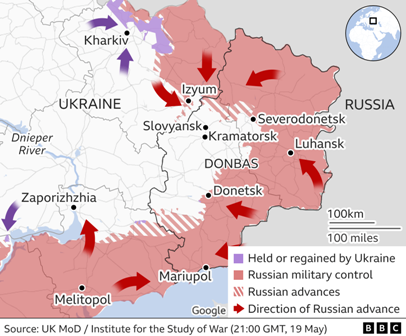Recovery of Fragile Economy from COVID-19 on Setback Due to Ukraine War
High inflation is reducing the real income of households, particularly in developing countries, where poverty is more prevalent, wage growth remains constrained, and fiscal support to alleviate the impact of higher oil and food prices remains limited.
Russian war in Ukraine has turned on its end the recovery of the fragile economy from the pandemic, triggering a devastating humanitarian crisis in Europe, increasing food and commodity prices, and globally exacerbating inflationary pressures says the latest United Nations latest forecast.
triggering a devastating humanitarian crisis in Europe, increasing food and commodity prices, and globally exacerbating inflationary pressures says the latest United Nations latest forecast.
As of mid-2022, the global economy is projected to grow by only 3.1 per cent in 2022, which is down from the 4 per cent growth forecast in January 2022. According to the UN’s World Economic Situation and Prospects (WESP), global inflation is projected to increase to 6.7 per cent in 2022, twice the average of 2.9 per cent from 2010–to 20, with sharp rises in food and energy prices.
The downgrades in growth prospects are broad-based, including the world’s largest economies, the US, China and the EU, and most other developed and developing economies. The growth prospects are weakening, particularly in commodity importing developing economies, driven by higher energy and food prices. The outlook is compounded by worsening food insecurity, especially in Africa.
“The war in Ukraine– in all its dimensions– is setting a crisis that is also devastating global energy markets, disrupting financial systems and exacerbating extreme vulnerabilities for the developing world,” said UN Secretary-General António Guterres.
Guterres added, “We need quick and decisive action to ensure a steady flow of food and energy in open markets by lifting export restrictions, allocating surpluses and reserves to those who need them, and addressing food price increases to calm market volatility.”
Impact on EU Countries
In addition to the tragic loss of many human lives and the unfolding humanitarian crisis, the war is exacting heavy tolls on the economies of the Russian Federation and Ukraine and the neighbouring economies in Central Asia and Europe, including the EU.
The sharp increase in energy prices represents a significant negative terms-of-trade shock for the EU, which in 2020 imported 57.5 per cent of its total energy consumption. The growth prospects for the EU economy weakened significantly, with its GDP forecasted to grow by only 2.7 per cent in 2022, instead of the 3.9 per cent projected earlier in January.
As imports from the Russian Federation accounted for almost 25 per cent of Europe’s energy consumption in 2020, a sudden halt in oil and natural gas flows would likely further increase energy prices and exacerbate inflationary pressures. The EU member states from Eastern Europe and the Baltic region are severely impacted as they are already experiencing inflation rates well above the EU average.
Prospects for Developing and Least Developed Countries
High inflation is reducing the real income of households, particularly in developing countries, where poverty is more prevalent, wage growth remains constrained, and fiscal support to alleviate the impact of higher oil and food prices remains limited.
The surge in food and energy prices has knock-on effects on the rest of the economy and poses an additional challenge to an inclusive recovery. It disproportionally affects low-income households that spend a much larger share of their income on food items.
The monetary tightening in the United States is also set to raise borrowing costs and worsen financing gaps in developing countries, including the least developed countries (LDCs). Tighter external financial conditions will adversely affect growth prospects, especially for the countries with high exposure to global capital markets facing debt distress or debt default risks.
“The developing countries will need to brace for the impact of the aggressive monetary tightening by the Fed and put in place appropriate macroprudential measures to stem sudden outflows and stimulate productive investments,” said Hamid Rashid, Chief of the Global Economic Monitoring Branch in the UN Department of Economic and Social Affairs (DESA), and the lead author of the report.
The challenge to Climate Actions
The war unfolds when global CO2 emissions are at a record high. The Russia—Ukraine conflict will significantly impact global efforts to deal with climate emergencies by driving up energy prices. As countries are looking to expand energy supplies amid high oil and gas prices, fossil fuel production is likely to increase in the short term. High costs of nickel and other metals may adversely affect the production of electric vehicles, while rising food prices may limit the use of biofuels.
“However, countries can also address their energy and food security concerns—brought to the fore due to the crisis—by accelerating the adoption of renewables and increasing efficiencies, thus strengthening the fight against climate change,” said Shantanu Mukherjee, UN DESA Director of Economic Policy and Analysis.
